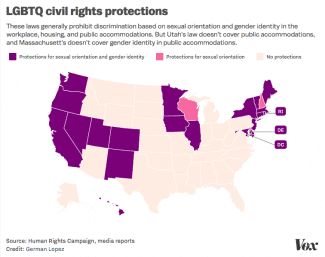The fact that we are boycotting Mississippi and North Carolina and last year avoided Indiana shows us that we don't know what is really going on in our country. We Americans have a short attention span and forget about something unless it is in our face covered in bells and whistles and glitter and yelling profanities at us. Anyone remember that we have just 8 Supreme Court Justices currently? Oh yeah, those Republicans were doing that thing where they didn't work. When was the last time you saw that on the news? We've moved on, even though it's probably the most important governmental occurrence for the next half year and will have a lasting affect for maybe decades to come.
Back to Mississippi and North Carolina and don't forget WWII Italy Indiana. We're paying attention to them now because they put glitter and bells and whistles on their laws of hate and discrimination and are now proclaiming it a little louder than the other 25 states that can legally practice the same thing they are. Ol' Miss and NC and Indy aren't any different than Alaska, Arizona, Idaho, Montana, Wyoming, North Dakota, South Dakota, Nebraska, Kansas, Oklahoma, Texas, Missouri, Arkansas, Louisiana, Alabama, Florida, Georgia, South Carolina, Tennessee, Kentucky, Ohio, Pennsylvania, West Virginia, Virginia, and Michigan and part timers Wisconsin and New Hampshire. After we won marriage equality for all, Indiana, Mississippi, and North Carolina were the first to brush off their LEGAL discriminatory laws and put a fresh coat of votes on them before they shoved them down our throats. What am I talking about? Well, let's see what Vox.com is talking about.
Yet if you saw the media coverage about the new law, you may not have any idea that anti-LGBTQ discrimination is already legal. Take the Washington Post's headline: "Mississippi governor signs law allowing businesses to refuse service to gay people." Reading this, you'd be forgiven if you thought the new law gives businesses a brand new ability to discriminate. The article does nothing to clarify that this type of discrimination was already legal.
This kind of misleading coverage is made worse by the fact that Mississippi isn't alone. Not only was anti-LGBTQ discrimination legal in Mississippi before its new law, it's still legal in most states.
The media enables this misinformation when it doesn't correct the record — when it doesn't point out that while a new law may allow discrimination, this discrimination was already allowed before the new law passed. And the widespread misinformation makes it harder for LGBTQ advocates to actually get this type of discrimination banned, since Americans aren't aware that discrimination is legal in the first place.
As Ian Thompson of the American Civil Liberties Union previously told me, "When people already think these protections are in place, it can be difficult to work up the motivation that's necessary to push for them."
It would be one thing if the poor media coverage happened just in Mississippi, but it's happened with each new uproar over states' anti-LGBTQ measures — in Indiana, Georgia, and North Carolina. While these measures may have enabled more discrimination by overturning municipal nondiscrimination laws, the outcry generally missed that this type of discrimination was already legal in most places in these states before they considered or passed any of their anti-LGBTQ measures.
Now, there is some debate that federal law may already protect LGBTQ people in some settings, since it bans discrimination based on sex (which advocates argue covers sexual orientation and gender identity) in the workplace, housing, and schools. Courts still need to decide whether federal law really does cover LGBTQ people.
But even if courts ultimately rule in LGBTQ people's favor, federal law does not include a ban on sex discrimination in public accommodations (restaurants, hotels, and other places that serve the public). So it would still be legal for businesses in most states to deny services to LGBTQ people — even if some federal laws' reach was expanded to sexual orientation and gender identity. – Vox.com
So imagine if you will if everyone was aware of the ability of people, states, and governments to discriminate against LGBT citizens. What would happen? Would they cancel their tours in all the states that already have laws that are just like Mississippi's and North Carolina's, but are just lacking a little glitter and bells?
h/t : Vox.com



